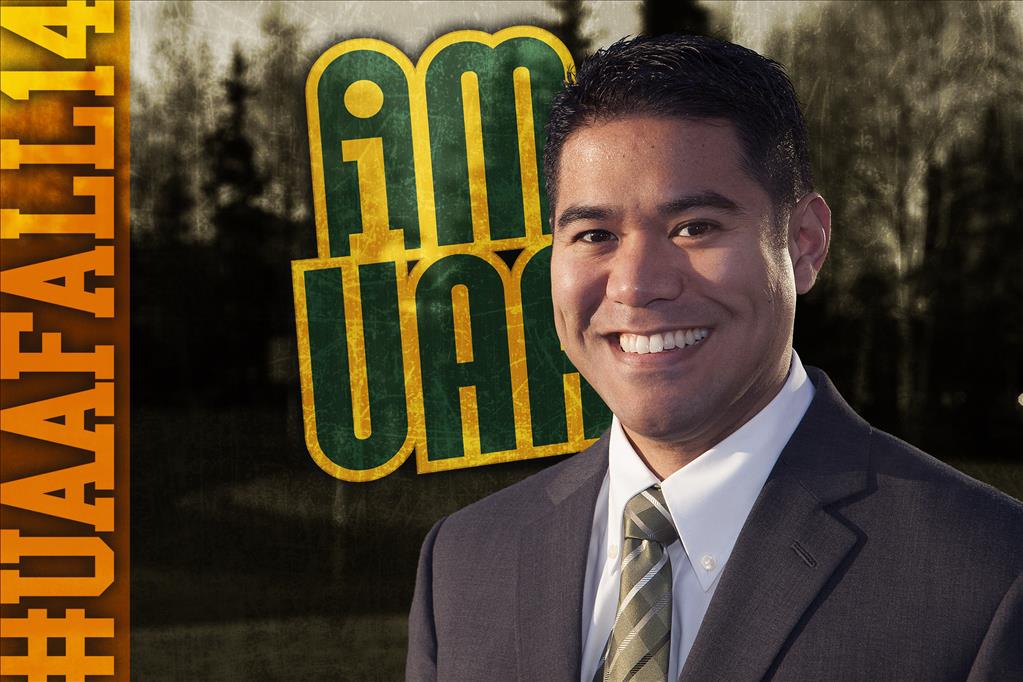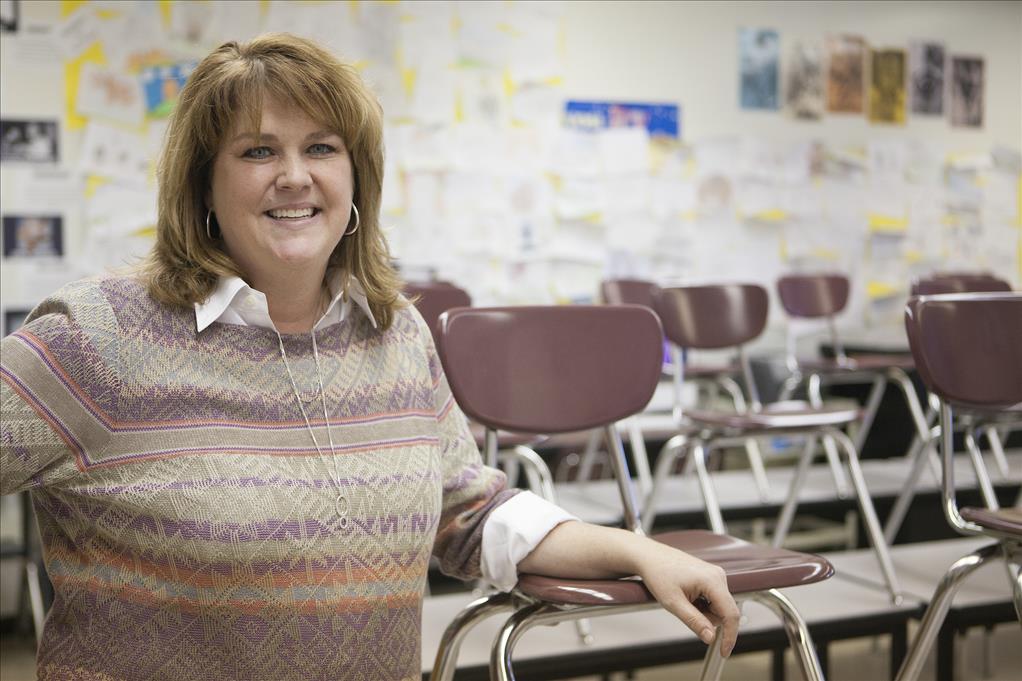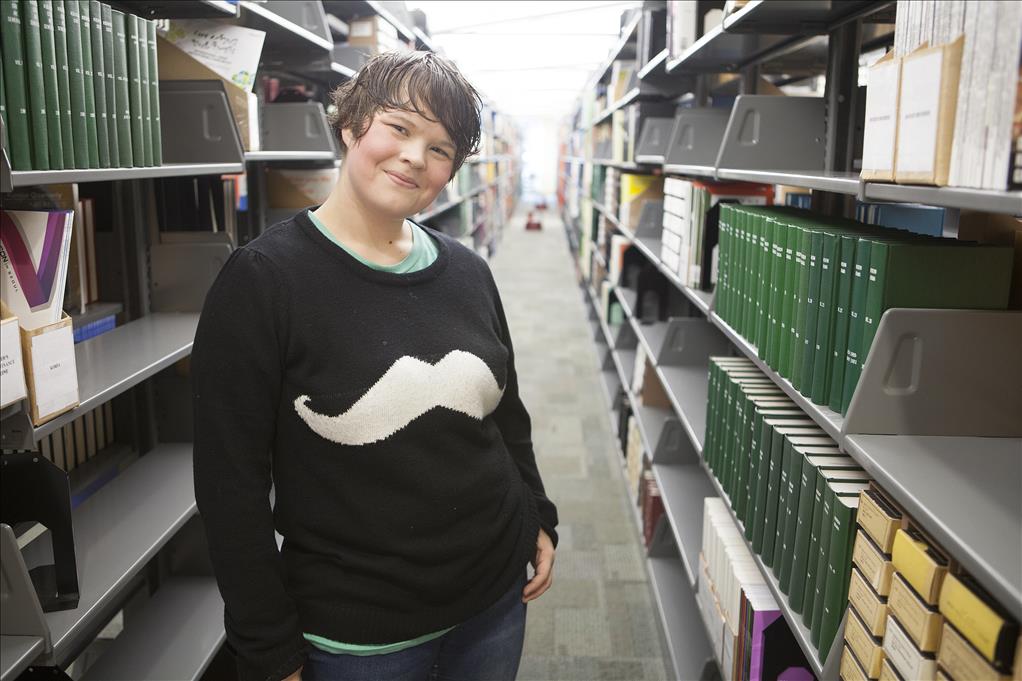Project 49: Ruth A.M. Schmidt, geologist, McCarthyism survivor
by Jamie Gonzales |
Project 49 is a monthly series from the University of Alaska Anchorage, highlighting characters and events from Alaska's rich history that have been preserved in our archives.

Ruth Schmidt stands tall (5'2") in the face of "Danger." Image dated May 30, 1958, near Seward Highway. Ruth A.M. Schmidt collection, Archives & Special Collections, UAA/APU Consortium Library.
Ruth A.M. Schmidt (1916-2014), the founder of UAA's geology program, lived a big life. She trained as a pilot and a boat captain and her stack of passports are bristling with stamps from her travels around the world as a geologist. She settled in the Last Frontier in 1956, though the adventures continued. She passed away in March, leaving her papers and a bequest to the Consortium Library Archives & Special Collections. There are a thousand stories (conservative estimate) in those boxes of documents and images. This one may be a little light on far-flung adventures-of which she had many in her 97 years-but instead gives you a snapshot of Schmidt's character in the face of injustice.
Born in Brooklyn at the tail end of the women's suffrage movement, Schmidt grew up in an America that was reluctant to open its arms to women and minorities. She didn't let it stop her from earning both an M.A. (1939) and a Ph.D. (1948) in geology from Columbia University. But the racial segregation she observed all around continued to rankle her. When she settled in Arlington on the outskirts of Washington, D.C., in 1943, she was working as a geologist for the U.S. Geological Survey, writing her Ph.D. thesis and looking for places to meet like-minded young people who cared about culture, history, art, science, world affairs and racial integration.
Joining the wrong book club

Cover of a 1948 edition of "The Bookshopper," the newsletter of The Washington Cooperative Bookshop, a "subversive" organization, according to the U.S. Attorney General, that also hosted picnics and gave out member discounts on books and music. Ruth A.M. Schmidt collection, Archives & Special Collections, UAA/APU Consortium Library.
She joined The Washington Cooperative Bookshop in 1945. The progressive organization offered cultural forums, art lectures and, importantly to Schmidt, many of their events were interracial. Her membership also gave her the chance to save money on books and records. Sounds harmless, right?
Wrong. Schmidt's affiliation with The Bookshop would nearly cost her a government job, not to mention what it cost her in lawyer fees (a lot). In 1950 and, with a stomach-clenching bit of dèjá vu, again in 1954, Schmidt received ominous letters from the U.S. Department of the Interior questioning her loyalty to the American government. She rallied her friends and colleagues and stood to defend herself against the charges before two McCarthy-era "loyalty boards." All charges against her stemmed from her involvement with The Bookshop.
The Second Red Scare and being branded 'subversive'
In 1947, U.S. Attorney General Tom Clark listed The Washington Cooperative Bookshop on his published list of "subversive organization." Alongside the Ku Klux Klan and the Nazi Party were organizations considered to be Communist fronts. The Washington Cooperative Bookshop, which sold copies of an American Marxist magazine, The New Masses, among its weekly and monthly newsletter/magazine selections, was one of them. In an era known as the Second Red Scare, tension between America and its communist adversaries was high and many U.S. government officials and civilians were seeing "Red" (and "Reds") everywhere they looked.

Scholar, adventurer, civil rights activist, reader, communist? Ruth Schmidt, circa 1957. Ruth A.M. Schmidt collection, Archives & Special Collections, UAA/APU Consortium Library.
In the summer of 1950, Schmidt received a registered letter from the U.S. Department of the Interior. The ultra-condensed, paraphrased version: We think you might be disloyal and we may fire you, depending on what you have to say for yourself about your connection with The Washington Cooperative Bookshop. Read a transcription of the full letter here.
Upon receiving what must have been the scariest registered letter of her life, Schmidt gathered her wits and her notes-diaries, calendars-to address the charges. The ultra-condensed, paraphrased reply: Yes, I was indeed a member of The Washington Bookshop Association. I even helped out with meetings here and there. I joined for the interracial cultural forums, the science lectures and the discounts. They seemed every inch a democratic organization to me, so much so that I put no stock in their listing as "subversive," when I learned of it in 1947. Read a transcription of the full letter here.
She had her statement notarized and sent to the Loyalty Board. "Unsatisfactory," they replied, bumping the process to Phase Two: a hearing. Schmidt retained a lawyer, David Cobb (who, side note, actually features prominently in Alaska's history having worked with his partner, "Lefty" Weissbrodt, to successfully represent Tlingit and Haidi tribes in Alaska land claims), and asked five of her friends and colleagues to speak on her behalf at the hearing.
Just try to imagine what that conversation would be like with your colleagues and friends. "Hey, Frank, how are the kids? Say, you think I'm a good American, right? Would you mind giving up a day in October to say precisely that in front of a Loyalty Board? It might cost you your job, too..."
The 1950 hearing
On Oct. 25, 1950, Schmidt was joined by those five colleagues and friends-Marie Siegrist, Jean Berdan, Alfred Bodenlos, Frank Whitmore, Jr., and Marjorie Hooker-who sat before a four-member Loyalty Board and fielded questions for nearly three hours from Chairman Mastin G. White, Dan H. Wheeler, Mrs. J. Atwood Maulding, E.L. Compton and Schmidt's lawyer, David Cobb.
Here are three samples from the 57-page testimony transcript that will make you question America's history as the vanguard of free speech, and make you scratch your head, wondering if you've made statements with a "communistic tinge" in your lifetime that might one day land you in hot water:
MISS SCHMIDT: I am unable to recall any instance of an undemocratic nature, or any effort to impose a Communist line upon Bookshop members.
MR. WHEELER: There was nothing in the Bookshop membership, as you recall it, that had any communistic tinge to it? It is one thing to impose a line-Do you mean that as narrowly as stated, or do you want to elaborate on it?
MISS SCHMIDT: I was not aware of any effort of anybody to impose their line or any particular way of thinking or doing things on the board. Everything was always discussed at great lengths. People were given an opportunity to express their opinions, to agree or disagree, and matters were always discussed openly. Does that answer your question?
MR. WHEELER: Well, in part.
MISS SCHMIDT: There was no person on the board I had any reason to believe was a Communist.
MR. WHEELER: This thing goes further than that-One may believe in Communism, I suppose, without being a Communist or a member of the Communist Party-but in your discussions, were they discussions of a communistic character?
MISS SCHMIDT: What do you mean by communistic character?
MR. WHEELER: I believe you know, Miss Schmidt, what I mean by that. The Bookshop was charged with being subversive in a communistic way.
CHAIRMAN: Yes, the determination by the Attorney General in 1947 listed the Bookshop as a Communist organization.
MR. WHEELER: What I'd like to know, were these meetings-regardless of how democratic the procedure, regardless of anybody trying to impose a line on anybody else or that you didn't know anybody was a Communist or a Communist Party member-regardless of all this, were there discussions of a communistic character or were they discussions of a cultural nature as the statement seems to indicate. Your interpretation is not broad enough. Does your statement that you didn't know of anybody who was a Communist also mean that you didn't know of anybody who seemed to believe in Communism? Then this statement to the effect that there were no discussions on the board while you were there to get people to believe in the Communist Party-
MISS SCHMIDT: The board was concerned with the operation of the store-with books to be bought, and could we get people to read books. The Bookshop was running at a deficit, so they discussed the problem of whether to have a party or a forum; where to hold meetings; or, for interracial meetings, where to hire a place where Negroes and whites could meet. I remember at one of our meetings, I have stated this, we wanted to help get books for the cafeteria workers. It impressed me because it was quite interesting. That was the only kind of thing discussed.
***
MR. COBB: What would you say of Miss Schmidt's loyalty to our form of Government?
MISS BERDAN: In the course of our friendship we have had a good many discussions about one thing and another and she has always had a tendency to champion the underdog. She is particularly strong on the subject of the race question and, oh, things like little business versus big business. She has always been very ardent in her championship of these various causes, but at no time have I ever heard her say anything that could be interpreted as following the Communist Party line in any way. I think I would have noticed it because I had known a number of parlor pinks during the 1930s and I would have spotted it, I think. She has always been very interested in certain liberal causes, but she has always been willing to listen to the other person's point of view. We usually had fairly lively discussions, but they were discussions. I usually vote Republican, and I think we might not have continued our friendship under the circumstances if she had displayed any communistic leanings. I have no question in my mind at all that she had any connection with the Communist Party. To me it is out of the question.
***
MR. COBB: Is it your opinion that Miss Schmidt is completely loyal to our capitalist, democratic form of Government?
MR. BODENLOS: I would say, yes.
MR. COBB: Would you state your reasons for that conviction?
MR. BODENLOS: Well, during this time, I think I recall having discussed political issues with Miss Schmidt on a number of occasions. I think both of us are more or less interested in public affairs. All through this 10-year period, I can't recall the slightest intimation of anything she said in any of these discussions, which covered many issues, that there was the slightest indication that she had any feeling that our system was not the best. The last discussion we had on politics-as I recall, my wife and I invited her over, I believe in July of this year, for dinner and again we discussed politics and other issues briefly. I think her views were absolutely no different than those you would find expressed in any newspaper on one side or another.
Cleared! And then not.
Schmidt and her supporters waited almost three months for the Loyalty Board's findings following the hearing.
"The Interior Department Loyalty Board, after having given you a hearing pursuant to your request and after having considered the complete file, testimony, and argument in your case, determined by a unanimous vote at a meeting held on October 30, 1950, that on all the evidence, no reasonable ground exists for believing that you are disloyal to the Government of the United States...Your case has been closed on the basis of the favorable determination by the Interior Department Loyalty Board," wrote Loyalty Board Secretary E.L. Compton in a January 1951 memorandum to Schmidt.

Two years after she was cleared of "subversive" leanings, Ruth Schmidt rocks a red (Red!) hat and blazer. Image dated August 28, 1956, Willow Creek Road, Alaska. Ruth A.M. Schmidt collection, Archives & Special Collections, UAA/APU Consortium Library.
Phew!
Then, just three years later, in April 1954, Schmidt received another registered letter, citing similar charges to the 1950 letter under a new executive order. Schmidt dusted off her 1950 hearing documents, penned another response deemed "insufficient," rehired Cobb and solicited affidavits of support from friends around the globe for a second hearing, this one in July 1954.
"I am sorry to have to bother you now with a request for some help, but the President's recent executive order on loyalty and security procedures has made it necessary for me to write to people who have known me well," Schmidt wrote to her friends before the hearing.
Popular support from all corners of the globe
Her friends came through in spades-letters poured in from New Hampshire, California, Japan, Greenland and Norway.

I ask you, would a communist folk dance? Letter of support from Rosemary Hines, friend of Ruth Schmidt. Ruth A.M. Schmidt collection, Archives & Special Collections, UAA/APU Consortium Library.
"Dear Ruth, We're certainly sorry to learn that you're a victim of the Republicans' security program. Though fortunately out of the earshot of this aspect of Washington life, it's still impossible to escape the impact and consequent disgust of our fearful government looking for spies in every corner," wrote Jo and John Coyle from their post in Tokyo, in a personal note to Ruth that accompanied their formal sworn letter to the Secretary of the Interior.
In November of that year, the Security Hearing Board notified Schmidt of their findings.
"It is the decision of this Security Hearing Board that the employment of Miss Ruth Anna Marie Schmidt in her present nonsensitive position is clearly consistent with the interests of national security," relayed Secretary of the Interior Douglas McKay in his letter to Schmidt.
Epilogue: Standing firm on shaky ground

The button collection of a woman who learned her lesson about civic engagement in McCarthy-era D.C. Or did she... Ruth A.M. Schmidt collection, Archives & Special Collections, UAA/APU Consortium Library.
Years later, in 1964, Schmidt had the misfortune to be standing smack dab in the middle of frozen Portage Lake with a team of researchers drilling for sediment samples from the lake bed when the 9.2 earthquake struck. They rode it out on cracking ice and managed to hike through the debris to safety when the lake stilled. It might be worth some digging to see if Schmidt included any journals among her donated papers that compare that shaky Alaska footing of 1964 with her shaky footing in D.C. during the previous decade.
The Ruth A.M. Schmidt collection is housed in the Consortium Library, Archives & Special Collections. It is open to the public. Visit their website for details. An online Ruth Schmidt exhibit is available here.
Written by Jamie Gonzales, UAA Office of University Advancement
 "Project 49: Ruth A.M. Schmidt, geologist, McCarthyism survivor" is licensed under a Creative Commons Attribution-NonCommercial 4.0 International License.
"Project 49: Ruth A.M. Schmidt, geologist, McCarthyism survivor" is licensed under a Creative Commons Attribution-NonCommercial 4.0 International License.














